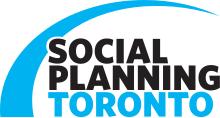| A major contributor to this article appears to have a close connection with its subject. It may require cleanup to comply with Misplaced Pages's content policies, particularly neutral point of view. Please discuss further on the talk page. (July 2016) (Learn how and when to remove this message) |
| The topic of this article may not meet Misplaced Pages's notability guidelines for companies and organizations. Please help to demonstrate the notability of the topic by citing reliable secondary sources that are independent of the topic and provide significant coverage of it beyond a mere trivial mention. If notability cannot be shown, the article is likely to be merged, redirected, or deleted. Find sources: "Social Planning Toronto" – news · newspapers · books · scholar · JSTOR (July 2016) (Learn how and when to remove this message) |
 | |
| Founded | 1957 |
|---|---|
| Location |
|
| Area served | City of Toronto |
| Method | Advocacy, Education, Community Engagement |
| Key people | Jin Huh (Executive Director) |
| Website | http://www.socialplanningtoronto.org/ |
Social Planning Toronto is a non-profit community organization, based in Toronto, Ontario, Canada that works to improve equity, social justice and quality of life for residents through community capacity building, community education and advocacy, policy research and analysis, and social reporting. The organization has conducted research and advocacy concerning inclusionary zoning, equitable use of city recreational spaces, the Ontario Human Rights Code policy on discrimination based on creed, and responses to the City's budget process.
The organization holds public forums for suggestions on what issues to prioritize.
Social Planning Toronto released the first poverty profiles for all 44 wards of Toronto, on 7 June 2012, which it declared "Destitution Day" because that was the approximate date when a person on welfare would run out of money if living at the poverty threshold.
See also
References
- "About Us". Social Planning Toronto.
- Skinner, Justin (May 26, 2015). "Social Planning Toronto looks at inclusionary zoning". Scarborough Mirror. Retrieved 18 July 2016 – via http://www.insidetoronto.com/.
{{cite news}}: External link in|via= - Fairbank, Viviane (July 6, 2016). "Creating Girls' Spaces in Toronto Community Centres Isn't That Simple". Torontoist. Retrieved 18 July 2016 – via torontoist.com.
- "Ontario Human Rights Commission forum at Social Planning Toronto examines discrimination based on creed". www.insidetoronto.com. Retrieved 2016-07-20.
- Shah, Maryam (July 10, 2016). "Budget needs to tackle widening 'fairness gap'". Toronto Sun. Retrieved 18 July 2016 – via http://www.torontosun.com.
{{cite news}}: External link in|via= - "Social Planning Toronto seeks input for future priorities". www.insidetoronto.com. Retrieved 2016-07-20.
- Monsebraaten, Laurie (6 June 2016). "Social Planning Toronto releases first-ever poverty profiles of the city's 44 wards on Destitution Day". thestar.com. Toronto Star. Retrieved 20 July 2016.